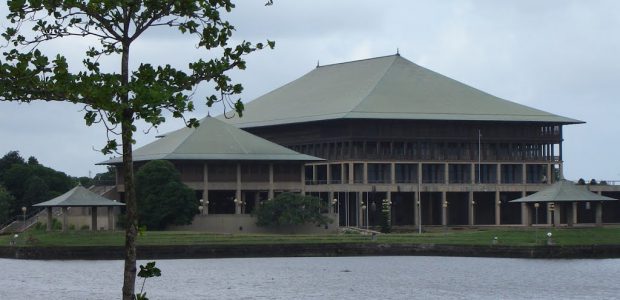Trusty Translators:
The One Profession Politics Cannot Buy
In Sri Lanka’s Parliament, the hardest jobs are not done by the MPs. They are performed by interpreters who offer simultaneous translation in three languages.
If there is a place where Sri Lanka’s tri-lingual language policy is properly implemented, it is in the parliament. In 1957, for the first time, simultaneous translations were introduced to Sri Lanka’s legislature: the first country in Asia to conduct its legislative process in three languages.
In the beginning, only Sinhala and Tamil languages were translated into English. Today, 36 interpreters work in the language translation division of Sri Lanka’s parliament, and produce Sinhala-Tamil-Sinhala, Sinhala-English-Sinhala, and Tamil-English-Tamil streams for all MP speeches and legislative sessions.
Priyankara Perera has been a parliamentary translator since 1999.
When I was translating I knew some things were totally false. But I translated lies anyway.
“In other countries including in the West, parliaments mostly work in one language. India’s parliament works in Hindi language, when there are many languages there. If something is happening in another language, parliament has to be informed one week early,” he said. “Sri Lanka’s parliament offers simultaneous translations of all three languages spoken in the country.”
Any citizen has the right to access information about all activities in parliament in all three languages. About 80 percent of the documents can be obtained in all three languages. Speeches of MPs and parliamentary sessions are offered in all three languages via television.
“According to international standards, if one engages in translations for half an hour, he or she has to rest for three hours,” explains Perera. “We usually work for three shifts per day. Apart from that, translations of Hansard (parliamentary debate) reports and committees are also done by us.”
It is not an easy task to carry out a meaningful simultaneous translation.
“It is not a problem to miss certain things when translating. But it is a serious fault if something is translated that has not been said. Sometimes when a problem comes up MPs are clever to say, the translation is wrong. Occasionally, the Speaker of the House might call us and conduct an investigation. After listening to the translations, we will be released, if the translation is correct.”
“We educate ourselves by reading books, gaining knowledge and learning words related to the subject. But sometimes they will say: that topic will not be taken up today. When that happens, the words we have memorized have no value.”
“There are only a few MPs who speak to the subject. Therefore, although we are prepared most of the time, the speeches may not be related to the subject.”
Sometimes the MPs tell lies, or obviously twist the truth.
“When I was translating I knew some things were totally false,” Perera says. “But I translated lies anyway. I had to work against my conscience. I couldn’t say: this is wrong. I had to forget all I knew to do the job.”
Sometimes, Perera even has to repeat swearing or other words that would not be acceptable in polite society. “But we are not saying them, it is the MP saying them,” Perera notes.
Not everyone can translate with all the languages of the Sri Lankan state, Perera concludes. “And there are only one or two jobs that cannot be undone by political influence: One of these is the job of the translator.”










